25 July 2023 – The 3 months-long conflict in Sudan has exacerbated the health situation with deadly consequences. When fighting broke out on 15 April 2023, the health system was already overwhelmed due to ongoing conflict, and hunger and disease outbreaks caused by the climate crisis, and it already had weak capacity to prepare for, prevent, timely detect and respond to health emergencies.
With displacement, lack of access to food, water, electricity, cash and health care, the number of people in need of humanitarian assistance, including emergency health services, has markedly increased; 24.7 million people, more than half the population, need humanitarian assistance, and 11 million people have been targeted for health response.
About 4 million children, and pregnant and breastfeeding women, are acutely malnourished, and over 100 000 under-five children with severe acute malnutrition with medical complications need specialized care at stabilization centres.
The health system is buckling under the enormous challenges of the closure of hospitals and shortages of staff, medicines and medical supplies, against escalating health needs. A staggering 67% (60 out of 89) are not functional in areas affected by conflict such as Khartoum, North Kordofan and Darfur. Hospitals, ambulances, supplies, warehouses, health workers and patients have been attacked; WHO verified 51 attacks between 15 April and 24 July 2023.
The conflict has injured more than 12 000 people and killed more than 1100 (Sudan Federal Ministry of Health, 11 July) and displaced millions of Sudanese and other nationals in the past 3 months alone. According to the IOM Displacement Tracking Matrix of 16 July, nearly 3.4 million people have been displaced by the conflict; an estimated 2.6 million people have been internally displaced and over 757 000 people displaced across the border into 6 neighbouring countries.
There are reports of cases of outbreak-prone diseases such as dengue, malaria, measles, acute watery diarrhoea and acute flaccid paralysis (AFP). Laboratory confirmation of these diseases is difficult as the National Public Health Laboratory has been occupied for nearly 3 months, and samples have had to be transported to reference laboratories in Egypt for confirmation.
Ongoing health crisis
Sudan was already gripped by multiple crises such as malnutrition from prolonged drought and displacement, disease outbreaks, including COVID-19, mpox, dengue, malaria, measles, dVDPV2 and hepatitis E, and a growing burden of noncommunicable diseases. The disruptions caused by the ongoing conflict will endanger the millions that require treatment for these diseases and reverse any progress made in the response to the humanitarian and health emergency, and the provision of essential health services and universal health coverage.
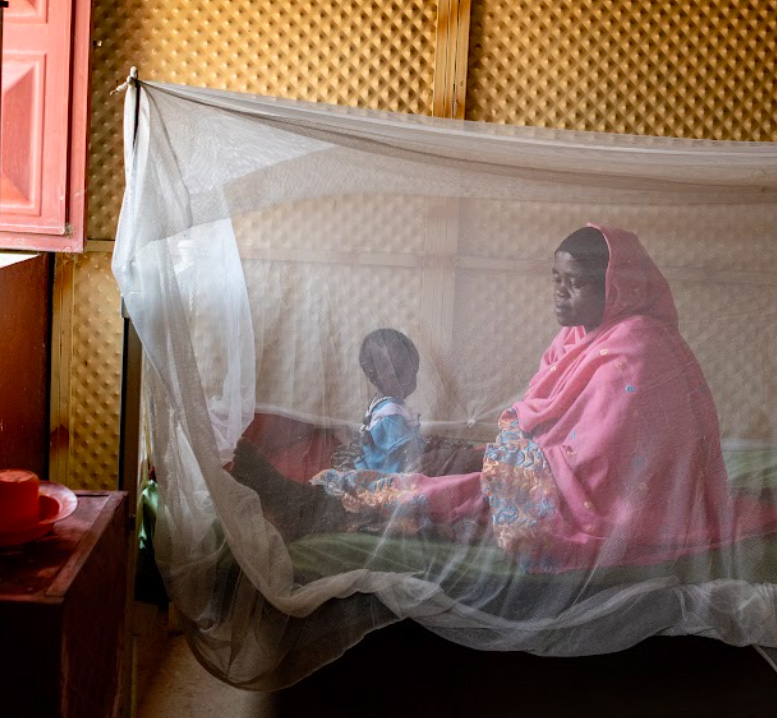 On 26 April 2022, a mother sits with her child under a mosquito net on a bed at a nutrition stabilization centre in Abu Shouk IDP camp in North Darfur. Photo credit: WHO/ Lindsay Mackenzie.
On 26 April 2022, a mother sits with her child under a mosquito net on a bed at a nutrition stabilization centre in Abu Shouk IDP camp in North Darfur. Photo credit: WHO/ Lindsay Mackenzie.
WHO on the ground responding to a massive crisis
To meet the urgent needs for medicines and medical supplies, WHO has delivered about 200 metric tons of emergency health supplies over the past 3 months, including inter-agency emergency health kits, trauma and emergency surgery kits, and medicines and equipment for the treatment of noncommunicable diseases, cholera, paediatric severe acute malnutrition with medical complications, and acute watery diarrhoea.
More supplies are ready for shipment from WHO’s logistics hub in Dubai and its warehouse in Port Sudan, but timely delivery of supplies is impeded by insecurity and operational hurdles.
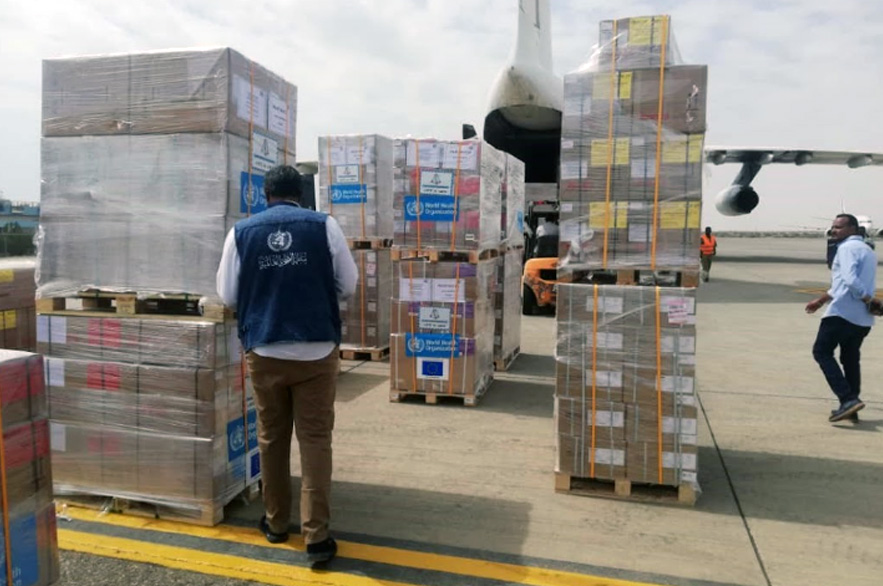 Since the start of the fighting in Sudan, WHO has delivered about 200 metric tons medicines and medical supplies into Sudan by air and sea to meet the urgent health care needs of the people, and has distributed supplies from its operations hub in Gezira state. Credit: WHO.
Since the start of the fighting in Sudan, WHO has delivered about 200 metric tons medicines and medical supplies into Sudan by air and sea to meet the urgent health care needs of the people, and has distributed supplies from its operations hub in Gezira state. Credit: WHO.
WHO staff have stayed on the ground coordinating partners for the health response and providing technical support, expert advice and capacity-building to support the essential health services and health emergency response, including the revitalization and establishment of stabilization centres for the management of severe acute malnutrition with medical complications.
3 months of conflict in Sudan: meet Dr Nader Makki, WHO expert responding to the crisis
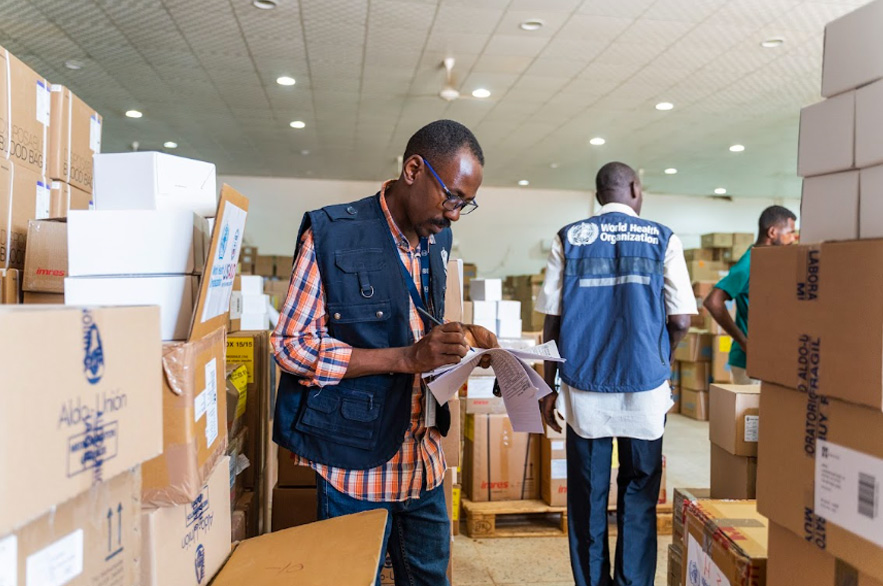 WHO's Adam Alnour helps prepares medical supplies for delivery to health facilities and displacement camps around Aljazeera state. The area is currently hosting many IDPs who fled conflict in Khartoum. Alnour is a polio officer but is currently supporting the emergency response in Aljazeera. Credit: WHO/ Ala Kheir.
WHO's Adam Alnour helps prepares medical supplies for delivery to health facilities and displacement camps around Aljazeera state. The area is currently hosting many IDPs who fled conflict in Khartoum. Alnour is a polio officer but is currently supporting the emergency response in Aljazeera. Credit: WHO/ Ala Kheir.
With the National Public Health Laboratory being inaccessible, WHO is working with government health authorities to transport samples to a reference laboratory in Egypt for confirmation of polio and measles.
Extraordinary chains of coordination to detect poliovirus amidst Sudan’s conflict
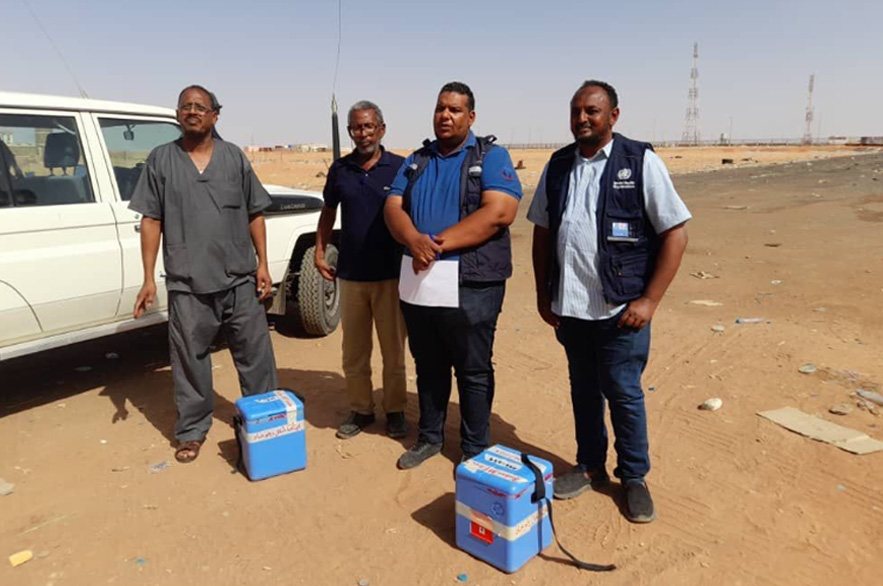 Dr Thabit (extreme right) and Hatim Babiker (second from left) handing over stool samples to the focal points from Egypt at the Argeen border crossing point. Credit: WHO Sudan.
Dr Thabit (extreme right) and Hatim Babiker (second from left) handing over stool samples to the focal points from Egypt at the Argeen border crossing point. Credit: WHO Sudan.
Cross-border response to the influx of refugees in neighbouring countries
WHO offices in neighbouring Central African Republic, Chad, Egypt, Ethiopia and South Sudan are responding to the health needs of refugees and returnees in collaboration with the respective host governments and through the health cluster mechanisms.
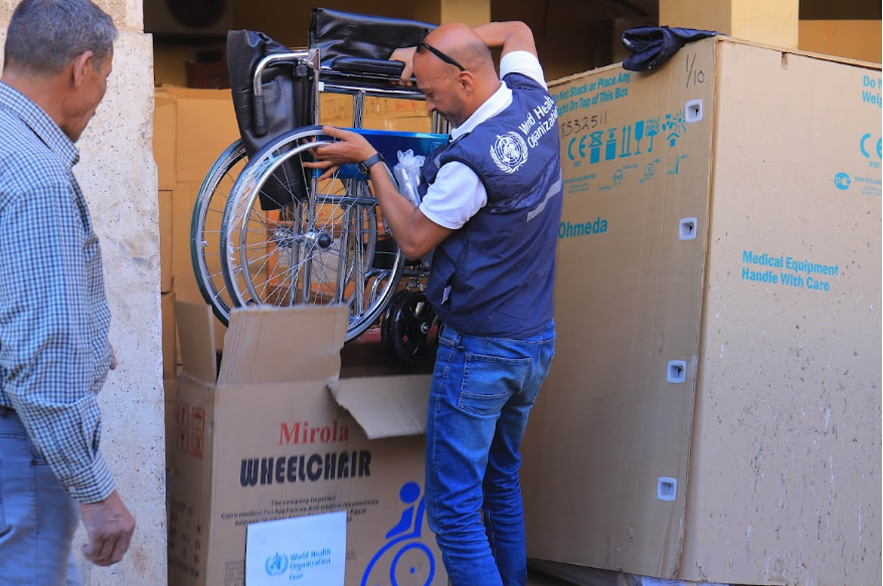 A WHO staff in Egypt handling a wheelchair dispatched by WHO in Egypt as part of medical and surgical supplies to help meet the basic health needs of the tens of thousands fleeing Sudan to Egypt through the Egyptian borders. Credit: WHO.
A WHO staff in Egypt handling a wheelchair dispatched by WHO in Egypt as part of medical and surgical supplies to help meet the basic health needs of the tens of thousands fleeing Sudan to Egypt through the Egyptian borders. Credit: WHO.
WHO remains committed to protecting the health of the Sudanese people and will continue to deliver techncal support and as much of the critically needed medicines and medical supplies as the security and operational challenges will permit. But the ultimate solution is peace to restore the dignity, health and well-being of the people of Sudan.





